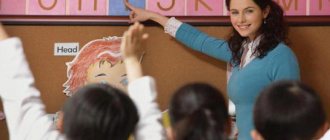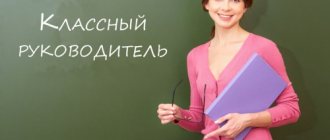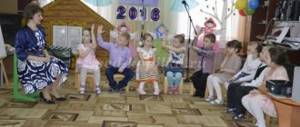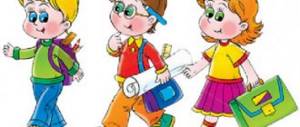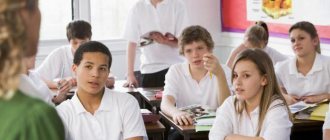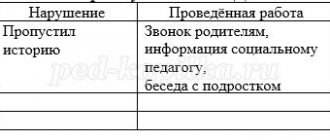Educational work project “My Future”
PROJECT “My Future”
Updating and improving the quality of education (educational work)
The project was prepared by
Nasyrova Adelya Alfitovna,
teacher of Russian language and literature
MBOU "Razdolnenskaya school-lyceum No. 1"
2016
- The name of the project is “My Future”……………………………….
- Project manager – A.A. Nasyrova……………………….
- Relevance of the topic…………………………………………….
- Application………………………………………………………………………………..
- Bibliography……………………………………………………
Project "MY FUTURE"
- The name of the project is “My Future”
- Project manager – A.A. Nasyrova
- Relevance of the topic
The life of every person is a great miracle! Unique and ordinary, joyful and sad, filled with deep experiences, sweet like honey and bitter like wormwood. It has many shades. And all this is the future of the student!
A child is born - his soul is like a white sheet of paper... Pure and transparent... The child begins to live, discover his world, get to know people, learn, love... And his soul is painted in different colors... what these colors are depends on what kind of Person he is it will become... If the color of the soul remains white, it means that a person’s life is empty, there are no desires and feelings... If the color of the soul becomes black, it means that evil and darkness rule in the soul... The black color of the soul is a heavy legacy that we received by forgetting about spirituality...
Who are you? Why did you come into this world? Which path will you choose so that there is less evil in the world, so that indifference never dominates the heart... What is the world of a child??? How to improve it? – These and many other questions and the search for answers to them are the main task of pedagogical support of the “My Future” project.
The first thing a child’s FUTURE depends on is HEALTH. Therefore, the main mini-project of the “My Future” project is the mini-project “Me and Health”. It combines the formation of knowledge, attitudes, personal guidelines and norms of behavior that ensure the preservation and strengthening of physical and mental health as one of the value components that contribute to the cognitive and emotional development of the child, the achievement of the planned results of mastering the basic educational program of education. The mini-project “Me and Health” was compiled taking into account factors that have a significant impact on the health of children:
- unfavorable social, economic and environmental conditions;
- risk factors occurring in educational institutions that lead to further deterioration in the health of children and adolescents from the first to the last year of study;
- sensitivity to impacts with simultaneous inertia to them by nature, causing a time gap between the impact and the result, which can be significant, reaching several years, and thus between the initial and significant manifestation of unfavorable population changes in the health of children and adolescents;
- actively formed complexes of knowledge, attitudes, rules of behavior, habits;
- peculiarities of students’ attitude towards their health, which is associated with the lack of experience of “ill health” in children (with the exception of children with serious chronic diseases) and the child’s perception of the state of illness mainly as a restriction of freedom, the inability to predict the consequences of their attitude towards health. Work on the mini-project “Me and Health” is supported by the following areas in the system of educational work:
Rational organization of educational and extracurricular activities of students,
aimed at increasing the efficiency of the educational process, while reducing excessive functional tension and fatigue, creating conditions for relieving overload, normal alternation of work and rest:
- compliance with hygiene standards and requirements for the organization and volume of educational and extracurricular workload (homework, classes in clubs and sports sections) of students at all stages of education;
- the use of teaching methods and techniques that are adequate to the age capabilities and characteristics of students (the use of tested methods);
- introduction of any innovations into the educational process only under control;
- strict compliance with all requirements for the use of technical teaching aids, including computers and audiovisual aids;
- individualization of training (taking into account individual developmental characteristics: pace of development and pace of activity);
- conducting systematic work with children with poor health and children with disabilities attending special medical groups under the strict supervision of medical workers.
Effective organization of physical culture and recreational work,
aimed at ensuring the rational organization of the motor regime of students, normal physical development and motor readiness of students of all ages, increasing the adaptive capabilities of the body, preserving and strengthening the health of students and creating a culture of health:
- full and effective work with students of all health groups (in physical education lessons, in sections, etc.);
- rational and appropriate organization of physical education lessons and active-motor activities;
- organization of dynamic changes, physical education minutes in lessons that promote emotional relief and increase physical activity;
- organizing the work of sports sections and creating conditions for their effective functioning;
- regular holding of sports and recreational events (sports days, competitions, Olympiads, hikes, etc.).
Implementation of additional programs:
- introduction into the system of work of an educational institution of programs aimed at developing the value of health and a healthy lifestyle (“Talk about proper nutrition”, “Growing up healthy, vigorous, brave”, “Additional classes on traffic rules”, “Studying the basics of fire safety”);
- holding health days, competitions, holidays, etc.;
- creation of a public health council, including representatives of the administration, high school students, parents (legal representatives).
Educational work with parents (legal representatives):
- lectures, seminars, consultations, courses on various issues of child growth and development, his health, factors that positively and negatively affect children’s health, etc.;
- work of parent clubs;
- organizing joint work of teachers and parents (legal representatives) to hold sports competitions, health days, classes on the prevention of bad habits, etc.
The second mini-project of the “My Future” project is “I am a citizen.” Nurturing civic feelings is the main color of this mini-project.
“Childhood is a great time of life, when the foundation is laid for the entire future of a moral person.” (N.V. Shelgunov)
It is difficult to disagree with this statement, because it is in childhood that the foundations of citizenship and respect for one’s history and people are laid. It is generally accepted to distinguish three components in consciousness: knowledge, attitude, and activity. This three-component structure complements the mini-project “I am a citizen”.
1 component – A person’s knowledge of the facts of culture, history, which are about
He
perceives events of history and culture as facts
(I know!).
Component 2 (main, system-forming) - a positive attitude towards certain facts of history and culture
(I am proud, I approve of such and such events, facts of our culture, history).
3rd component – active.
This is a willingness to participate in activities to develop culture and life in our country (position - “I am ready, determined to act for the benefit of our country”).
The traditional goal of civic education in an educational institution is the formation of legal knowledge, rules of behavior in society, since every child is in society, the formation in schoolchildren of civic responsibility and legal self-awareness, spirituality and culture, initiative and independence, tolerance, the ability to socialize in society and to active adaptation in the labor market.
The areas that I propose to use in the mini-project “I am a citizen”: civil, local history, legal.
The third mini-project of the “My Future” project is the mini-project “I am a Patriot”. The goal of patriotic education of this mini-project is to form the patriotic consciousness of schoolchildren, to educate patriots with a sense of national pride, civic dignity, and love for the Fatherland and their people. This goal covers the entire pedagogical process, permeates all structures, integrating educational activities and extracurricular life of students, various types of activities. Its achievement becomes possible through solving the following tasks:
- to form a conscious attitude towards the Fatherland, its past, present and future on the basis of historical values and the role of the state in the destinies of the world;
- create conditions for each student to realize his own position through the activities of student self-government bodies;
- develop and deepen knowledge about their native land.
When forming a patriotic consciousness, it is important to take into account the fact that our society is very differentiated in its views, positions, and interests. Interaction, clash of interests, beliefs, positions are a modern reality. If we want to form a person capable of living in such a society, it is necessary to create problematic situations that require schoolchildren to analyze complex phenomena, defend their positions, and be able to constructively interact with such positions.
The fourth mini-project of the “My Future” project is the mini-project “Me and Morality”. In the modern period of a new socio-historical turn in people’s lives, when society is absorbed in the problems of undeveloped market relations, economic instability, and political difficulties, social ties and moral foundations are being destroyed. This leads to regression of humanity, intolerance and bitterness of people, disintegration of the inner world of the individual, and a vacuum of spirituality. That is why the school, solving social problems of education today, must rely on the rational and moral in a person and help each student determine the value foundations of his own life, and gain a sense of responsibility for preserving the moral foundations of society. This can be done through specially organized ethical education of schoolchildren, organically woven into the educational process and constituting its integral part. What is the essence of such a system? It is based on the logical relationship of the following structural components: - an ethical lesson as a specialized educational subject, built using an innovative methodology with a plot-game basis; - an everyday pedagogically instrumental method of “ethical charge”, operating in the system of free communication of children during recess and after school hours. The technique involves a combination of an ethical attitude towards benevolence and respect in relationships with forms of preventing conflict situations and worthy exit from them; - general collective extracurricular activities with an ethical focus, specifically focused on including all students in ethical dialogue, communication, and interaction. Each of the components of the system, having its own function, specific content and methodological features, carries out a certain part of the general pedagogical task of moral education of schoolchildren.
The fifth mini-project of the “My Future” project is the mini-project “I am a man”. The main goal of this mini-project is to study the student’s personality. The study of a student’s personality should be carried out in natural conditions. The main method in this case is psychological observation of the behavior, specific activities and actions of the student in academic work, in the team and outside of school. Based on the accumulated material, a profile of the student is compiled, a program of personal self-improvement is outlined, etc. In order to carry out a deep and comprehensive study of personality, it is necessary to use a variety of study methods. In addition to observation, these include:
- Conversations with the student about some problems, books read, performances watched, etc. Conversations with his classmates and friends in the class, sports section, circle. Conversations with the class teacher and other teachers about the student. Conversations with his parents.
- Method of generalized characteristics.
- Psychological and pedagogical experiment.
- A method for studying the objective results of a student’s activities.
- Questioning.
- Sociometry.
The sixth mini-project of the “My Future” project is the mini-project “I am a schoolboy.” The student’s position in life immediately makes one feel the difference and makes one emerge from many illusions. It requires some effort. We constantly evaluate the motives of our actions, desires, and feelings. The pride of the people around us immediately becomes a training tool for us. In pride a person does not see far. The position of pride is very limited. Unlike the student position, it does not provide perspective. But she is very strong in people, because from this position everything becomes very simple and understandable to an ordinary schoolchild. Therefore, the main goal of this mini-project is to learn to learn and teach to learn; teach development and learn self-development.
The seventh mini-project of the “My Future” project is the mini-project “I am a Crimean”. Perceiving yourself as a part of the land on which you live begins in childhood. Understanding it as one’s “little homeland” certainly comes – especially if a young person has the opportunity to travel around his native land and directly perceive the historical and cultural monuments of his ancestors with his own eyes. Crimea, in this sense, has enormous civilizational potential. We can say that, in some way, Crimea is the focus of world culture. In a relatively small area we observe natural landscapes and monuments of various historical eras of amazing diversity and beauty. Crimea is a reflection of the multilingual and multicolored world culture.
The beauty that surrounds a person leaves color in the soul. You just have to look at it and not miss it. It’s not without reason that they say that beauty will save the world. Therefore, a special place in the “My Future” project is given to the education of a child’s aesthetic competencies: this is the eighth mini-project “I am a creator”.
Formation of labor skills, resolving issues of the correct choice of profession, socially useful work, self-government, public assignments, rational use of one’s interests and capabilities, cooperation - the main directions of developing labor competencies of schoolchildren in the “My World” project, reflected in the ninth mini-project “Me and Labor” "
A family is a unit where a child gains folk wisdom, adopts the life experience of his parents, learns to understand others, love, and care for them. Therefore, only together with a family where a relationship with a child has been formed that is based on mutual understanding, respect, tolerance and free from emotional dependence, only together with such a family can one build a unified line of raising a child. This direction of the “My Future” project is reflected in the mini-project “I am in the Family”.
- Project sections:
- Me and health
- I am a citizen
- I'm a patriot
- Me and morality
- I am human
- I am a schoolboy
- I am a Crimean
- I am a creator
- Me and work
- I'm in the family
- Objective of the project:
Everyone remembers from childhood how the heroes of the fairy tale about Pinocchio dreamed of opening the fairy-tale door to HAPPINESS with the help of a golden key. Make the system of educational work at school such that every day brings HAPPINESS to the child, select the key for each direction. - this is the main thing that the “My Future” project is aimed at.
Objective of the project
:
- formation of a moral and spiritual personality, successfully self-realizing in society as a citizen, patriot, Crimean, family member, future professional, creator, physically and morally healthy person;
- creation of a comprehensive model of an EDUCATIONAL SYSTEM based on civic and human values and the formation of vital and important individual competencies.
To achieve this goal, the following tasks are envisaged:
- Organization of the educational process in the classroom and work with parents based on project pedagogy;
- Development of plans for educational work for individual classes, taking into account the individual pedagogical capabilities of class teachers, parents, as well as the results of research into the level of physical, social, mental and spiritual development of students;
- Contents of educational work plans taking into account the age characteristics of students;
- Satisfying the basic needs of the student’s personality (physiological needs, safety requirements, interests and inclinations) in a school setting;
- Implementation in the process of education of personality-oriented, activity-based, systemic, creative and competence-based approaches to organizing the educational process;
- Optimal use of all forms of organizing educational work: individual, group and mass;
- Creation of appropriate conditions for the personal improvement of each student (situations of success and support), their psychological and pedagogical support;
- Cooperation with self-government bodies;
- Integration of the efforts of parents, the public, representatives of government agencies, public and charitable organizations, law enforcement agencies and health care authorities in addressing issues of student education.
- Directions of project activity:
- Information block: processing materials, writing mini-projects,
- Technological block: script writing,
- Organizational block: creating an educational environment for the project.
- Type of project: educational, collective.
- Project participants: school students, their parents, school staff, and the public.
- Project implementation period: academic year
- Expected results: creation of a SYSTEM of educational work in school, aimed at the student’s personality.
- Providing project activities:
- Methodical:
“The concept of priority areas of educational work in educational institutions of the Republic of Crimea”, Simferopol, 2010,
- Internet materials,…
Material and technical resources required to complete the project:
Selection of literature,
- Event preparation,
- Carrying out holidays, KTD.
- Stages of the project:
Information-accumulative stage:
- Studying the interests of students,
- Collection of information,
- Setting the main tasks,
- Discussion of materials on sections of the project.
- Organizational and practical stage:
| № | The content of the work | Deadlines | Class | Responsible | Prim |
| 1 | Drawing up and implementation of mini-project 1 “Me and Health” | During the year | 1-11kl | Class teachers, teacher-organizer, deputy director for education, project manager | |
| 2 | Drawing up and implementation of mini-project 2 “I am a citizen” | During the year | 1-11kl | Class teachers, teacher-organizer, deputy director for education, project manager | |
| 3 | Drawing up and implementation of mini-project 3 “I am a patriot” | During the year | 1-11kl | Class teachers, teacher-organizer, deputy director for education, project manager | |
| 4 | Drawing up and implementation of mini-project 4 “I and morality” | During the year | 1-11kl | Class teachers, teacher-organizer, deputy director for education, project manager | |
| 5 | Drawing up and implementation of mini-project 5 “I am a man” | During the year | 1-11kl | Class teachers, teacher-organizer, deputy director for education, project manager | |
| 6 | Drawing up and implementation of mini-project 6 “I am a Crimean” | During the year | 1-11kl | Class teachers, teacher-organizer, deputy director for education, project manager | |
| 7 | Drawing up and implementation of mini-project 7 “I am a schoolboy” | During the year | 1-11kl | Class teachers, teacher-organizer, deputy director for education, project manager | |
| 8 | Drawing up and implementation of mini-project 8 “I am a creator” | During the year | 1-11kl | Class teachers, teacher-organizer, deputy director for education, project manager | |
| 9 | Drawing up and implementation of mini-project 9 “Me and Work” | During the year | 1-11kl | Class teachers, teacher-organizer, deputy director for education, project manager | |
| 10 | Drawing up and implementation of mini-project 10 “I am in the family” | During the year | 1-11kl | Class teachers, teacher-organizer, deputy director for education, project manager |
- Presentation is the final stage.
- Control-reflexive stage:
- Summing up the project (teaching council, May, responsible - school administration, project manager),
- Questionnaire or survey of students (May, responsible - school administration, project manager).
- Necessary conditions for the implementation of the project:
- interest of students and parents,
- availability of methodological developments,
- knowledge of the individual characteristics of students.
Project hypothesis:
You shouldn't expect students to change instantly. But if during the implementation of the project children become more friendly, responsive, tolerant, attentive, active, then we can consider that the goal and objectives of the project have been fulfilled, that is, the designed model for organizing educational work in school through the “My World” project meets the requirements of State Education Standards .
- Project methods:
- Observation,
- Questioning,
- Communication hours,
- Individual conversations,
- Psychological diagnostics,
- Activity,
- KTD,
- Excursions,
- Interview,
- Interactive forms of work: “unfinished sentence”, “circle of friends”, “wheel of ideas”, “aquarium” and others,
- Disputes,
- Trainings,
- Exhibitions,
- Search operations,
- ICT, etc.
- Financial support for the project:
| № | Kind of activity | Equipment | At whose expense is it purchased? | Note |
| 1 | Social hours | Discs, developments | Teachers, material support fund | Note |
| 2 | Events | A-4 paper, discs | Teachers, parents | |
| 3 | Event development | A-4 paper, disks, printout | Teacher, parents | |
| 4 | Souvenirs for rewarding participants | Souvenirs | Material Support Fund |
3.References
1.Boiko V.V. Purposeful development of human motor abilities. - M.: Physical culture and sport, 1987 - 180 p.
2. Vygotsky L.S. Pedagogical psychology / L.S. Vygotsky. M.: Pedagogika-Press, 1999. - 536 p.
3. Gayazov A.S. Formation of civic qualities of high school students in joint work / A.S. Gayazov // Author's abstract. Ph.D. ped. sciences.- 1986.- 18 p.
4. Dewey J. School and Society. Child education program / J. Dewey. -M.: Education, 1968. 159 p.
5. Physical education classes with schoolchildren assigned to a special medical group. / M.D. Ripa, V.K. Velitchenko, S.S. Volkova. – M.: Education, 1988. – 175 p.
6. Zdravomyslov A.G. General sociology. Reader / A.G. Zdravomyslov. -M.: Higher School, 2006. 783 p.
7. Kiryakova A.V. Theory of personality orientation in the world of values / A.V. Kiryakov. Orenburg, Southern Urals, 1996. - 188 p.
8. Koshurina N. Living soberly is not a problem. // Education of schoolchildren. - 2009. - No. 5.
9. Lunacharsky A.V. Cultural tasks of the working class: Human and class culture / A.V. Lunacharsky. Collection op., vol.2. M.: Literature, 1965. - P. 183-198.
10. Lyakh V.I. Motor abilities //Physical education at school. -1996. No. 2.
11.Nazarova S.N. Healthy lifestyle. // Last call. - 2011. - No. 10.
12.Novoselchenko T.I. Project “Learn to defend your rights” // Class teacher. - 2011. - No. 2.
13.Petrov P.K. Methods of teaching gymnastics at school. – M.: “Vlados”, 2000. – 445 p.
14.Theory and methods of physical education: Textbook. for physical institutes culture / Under the general ed. L.P. Matveeva, A.D. Novikova. - T.1. General fundamentals of the theory and methodology of physical education. - M.: Physical culture and sport, 1976. - 250 p.
15.Filonov G.N. Approaches to programming civic education in the education system / G.N. Filonov. Fostering patriotism, friendship of peoples, religious tolerance. M., 2001. - pp. 32-34
List of sources
1. https://dl.allbest.ru
2. https://www.kontrolnaja.ru/referats/physical_culture_and_sport
3. https://planetadisser.com/see/dis_61301.htm
